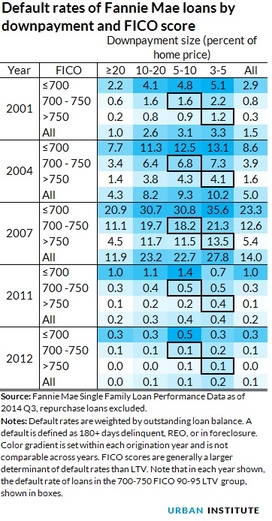Ever since Mel Watt hinted at the return of 3% down mortgages, there’s been a lot of worry that we could be headed down another dark path.
After all, it was a lack of skin in the game that caused all the carnage during the most recent housing crisis, right?
Well, maybe not. An analysis from the Urban Institute seems to put the blame more on low credit scores than low down payments.
They looked at Fannie Mae’s default rates for 30-year fixed mortgages before, during, and after the crisis to see what kind of impact ultra-low down payments had on mortgage performance.
In 2001, the default rate on mortgages with a 3-5% down payment (95-97 LTV) was 3.3%, compared to 3.1% for loans with a 5-10% down payment (90-95 LTV).
During 2007, the worst mortgage performance year in recent history, the default rate climbed as high as 27.8% for 3-5% down mortgages, compared to just 22.7% for the 5-10% down cohort.
Post-crisis, the defaults numbers are super low for both groups, and were in fact the same in 2011 at 0.4%.
In 2012, the 95-97 LTV loans defaulted at a rate of just 0.2%, compared to 0.1% for the 90-95 LTV group.
What About Borrowers with Excellent Credit?

- The data show that credit score is huge
- When it comes to predicting mortgage default
- Even if the borrower comes in with a low down payment
- A low credit score seems to be more impactful
Interestingly, the numbers move a whole lot more when you throw credit score into the mix.
For example, in 2001 the default rate was 1.2% on loans with a 3-5% down payment and a credit score of 750 and above. Meanwhile, mortgages with down payments of 5-10% and credit scores between 700-750 had a default rate of 1.6%.
This trend can be seen throughout all the years in the analysis. In every instance (other than 2012) a lower credit score coupled with a higher down payment led to a higher default rate.
During 2007, the 95-97 LTV loans with 750+ FICO scores had a default rate of 13.5%, much lower than the 18.2% default rate seen with 90-95 LTV loans with 700-750 credit scores.
The more recent data doesn’t show much of a difference, but the data is pretty fresh and mortgage performance has been a lot better.
If you look at credit scores of 700 and below, the default rates skyrocket no matter what the borrower actually puts down. The upside is that they can sell and/or the bank won’t get stuck with an underwater mortgage.
Low Credit Scores Are Always Bad, Low Down Payments Can Be Bad
- The takeaway is that a low credit score is always bad
- At least relative to higher credit scores
- Whereas down payment size isn’t necessarily a default indicator
- But you probably still want the borrower to have some skin in the game
What seems to be clear is that a mere two-percent difference in down payment doesn’t lead to many more defaults in normal situations.
More importantly, a low credit score can result in some really ugly stuff, regardless of what’s going on in the market.
Obviously a combination of high credit score and high(er) down payment is best, as you can see from the data, but perhaps we shouldn’t freak out so much about low down payments.
My assumption is that credit scores are a pretty good way to determine if someone will make good on mortgage payments, whereas down payment-related performance tends to be dependent on what happens with home prices.
If home prices take a dive, those with little skin in the game will probably strategically default, but I’m not sure two percent would make a difference.
However, if home prices are steady or up, down payment size probably won’t come into play much, while a low credit score can certainly be a problem.
Put simply, low credit scores are always going to be an issue whereas low down payments can look bad in hindsight if and when home prices tank.
In other words, offering 3% down mortgages to creditworthy borrowers makes sense. Offering them to borrowers with terrible credit scores, FHA I’m looking in your direction, is the opposite of smart.

